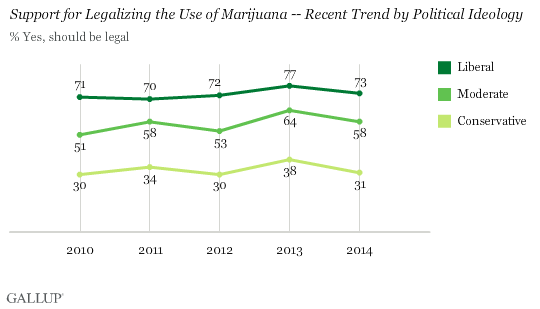More than 33 years after he
died of cancer, Jamaican reggae music legend Bob Marley is getting ready
to stir things up posthumously , if not lively up the surging
commercial marijuana market, as the name and face of what is being billed as the world's first international marijuana brand.
Marley Natural,
which is described as "heirloom Jamaican cannabis strains,” is targeted
to ship before the end of 2015 to sales outlets in countries where pot
is legal. To help ensure a big roll-out, Marley Natural products will be
packaged and marketed
with input from the same P.R. agency that played a key role in branding
Starbucks Coffee and New Balance running shoes. A Marley Natural
slogan, "Make way for the positive day," has already been introduced.
At least one of Bob Marley's quotes – "When you smoke the herb it reveals you to yourself" – is also being used in the marketing
campaign for Marley Natural. Members of the deceased reggae
singer-songwriter's family announced Marley Natural on Tuesday morning's
edition of the TV show NBC Today.
The
video makes no mention of Bob Marley having been, as many Jamaicans and
reggae artists are to this day, a devout Rastarfarian. The monotheistic
Rastafari religious movement regards marijuana as a “sacrament” and
contends its use is, in fact, sanctioned by the Bible.
How
so? Rastafarians point to a line in Psalms 104:14: “He causes the grass
to grow for the cattle, and herb for the service of man.” The video
also omits any mention of the fact Marley reportedly smoked nearly a
pound of pot per week.
Marley
Natural is the brainchild of the Seattle-based private equity company
Privateer Holdings, which exclusively focuses on marijuana industry
products and investments. Marley Natural will also sell an array of
other pot-related products, including marijuana creams, lotions and
various accessories, such as e-cigarette-styled vaporizers, inspired by
both Marley and marijuana.
In
a taped video statement provided to NBC News, Cedella Marley, 47, Bob's
first-born daughter, said: "It just seems natural that Daddy should be
part of this conversation. As Daddy would say: 'Make way for the
positive day'."
The video
also includes Rohan Marley, 42, one of Bob and Rita Marley's sons. "Herb
is for the healing of the nation," he said. "Herb is for the
meditation; herb is for the higher vibrations."
Cedella
and Rohan's mother, Rita Marley, agrees, saying: “My husband believed
‘the herb’ was a natural and positive part of life, and he felt it was
important to the world. He looked forward to this day.”
Apparently, Marley also looked forward to more widespread marijuana cultivation and sales.
A statement posted Tuesday
morning on his website reads: "As a brand with a strong social
conscience, Marley Natural’s business model and philanthropic
initiatives will be built to ensure that families and communities who have been harmed by prohibition have the opportunity to benefit from the new, legal cannabis economy."
The
Marley estate earned an estimated $20 million over the past year,
according to a Forbes magazine tally published last month. Those
pre-Marley Natural earnings could now grow significantly higher.
The launch of Marley Natural is the latest example of how what is becoming known as "canna-business" is taking off in a big way.
Four
states – Alaska, Colorado, Oregon and Washington – plus the District of
Columbia allow pot to be sold for recreational purposes. In September
alone, taxes on pot products legally sold in Colorado brought more than
$26 million to the state's coffers.
Meanwhile, the use of pot has been
decriminalized in 23 other states. Medical marijuana is legal in
California, although the proliferation of pot dispensaries remains
contentious in many cities in the state, including San Diego.
Coming next week (well, maybe): Former
members of the Grateful Dead and a slew of hip-hop stars jostle to be
the first U.S. music to announce their own line of pot products.
Luxury French Lingerie
http://tinyurl.com/o7qcz7m
From chocolate eggs to chocolate coins, give your sweet tooth a treat with our delicious products.
http://tinyurl.com/nragc9j
Luxury French Lingerie
http://tinyurl.com/o7qcz7m
From chocolate eggs to chocolate coins, give your sweet tooth a treat with our delicious products.
http://tinyurl.com/nragc9j

 Jasmin M. Rojas, JD, is a Legal Editor for BLR’s human resources and employment law
publications. Ms. Rojas has several years of experience as an attorney
and writer in the field of human resources and has published numerous
articles on a variety of human resources and employment topics,
including compensation, harassment, discrimination, work/life issues,
termination, and military leave. Ms. Rojas has also presented seminars
and conducted supervisory training on issues including, but not limited
to, sexual harassment and other forms of workplace harassment, ADA,
FMLA, internal investigations, workplace violence and workplace
privacy.
Jasmin M. Rojas, JD, is a Legal Editor for BLR’s human resources and employment law
publications. Ms. Rojas has several years of experience as an attorney
and writer in the field of human resources and has published numerous
articles on a variety of human resources and employment topics,
including compensation, harassment, discrimination, work/life issues,
termination, and military leave. Ms. Rojas has also presented seminars
and conducted supervisory training on issues including, but not limited
to, sexual harassment and other forms of workplace harassment, ADA,
FMLA, internal investigations, workplace violence and workplace
privacy.

